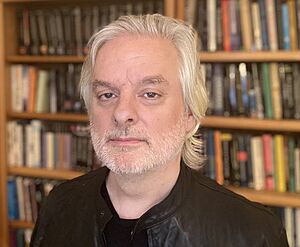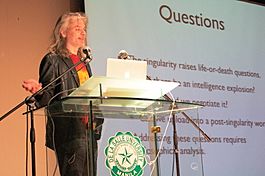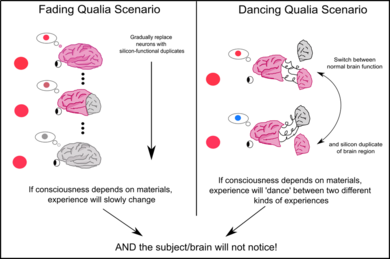David Chalmers facts for kids
Quick facts for kids
David Chalmers
|
|
|---|---|

Chalmers in 2021
|
|
| Born |
David John Chalmers
20 April 1966 Sydney, New South Wales, Australia
|
| Education | University of Adelaide (BSc, 1986) University of Oxford (1987–1988) Indiana University Bloomington (PhD, 1993) |
| Era | Contemporary philosophy |
| Region | Western philosophy |
| School | Analytic |
| Thesis | Toward a Theory of Consciousness (1993) |
| Doctoral advisor | Douglas Hofstadter |
|
Main interests
|
Philosophy of mind Consciousness Philosophy of language |
|
Notable ideas
|
Hard problem of consciousness, extended mind, two-dimensional semantics, naturalistic dualism, philosophical zombie, further facts |
David John Chalmers (born 20 April 1966) is a famous Australian philosopher and cognitive scientist. He studies how our minds work and how we use language. He is a professor at New York University (NYU). He also helps lead NYU's Center for Mind, Brain and Consciousness.
Chalmers is well-known for talking about the "hard problem of consciousness." This is a big question about why we have feelings and experiences. He also made the idea of a "philosophical zombie" popular. This is a thought experiment to help us think about consciousness.
David Chalmers and David Bourget also started PhilPapers. This is a huge online library of articles for philosophers.
Contents
Early Life and Learning
David Chalmers was born in Sydney, New South Wales, Australia. He grew up in Adelaide, South Australia. As a child, he had synesthesia, which means his senses mixed. For example, he might see colors when he heard music.
He started coding and playing computer games when he was 10. He was also very good at mathematics. He even won a bronze medal in a big math competition called the International Mathematical Olympiad. When he was 13, he read a book called Gödel, Escher, Bach. This book made him interested in philosophy.
Chalmers studied pure mathematics at the University of Adelaide. After college, he traveled around Europe and read many philosophy books. He then went to the University of Oxford as a Rhodes Scholar.
In 1993, he earned his PhD in philosophy and cognitive science. He got this degree from Indiana University Bloomington. His main teacher was Douglas Hofstadter. His PhD paper was called Toward a Theory of Consciousness.
His Work and Career
In 1994, David Chalmers gave an important talk. It was at a conference about the science of consciousness. This talk made him a very important thinker in this field. He helped organize this conference for some years.
Chalmers became a professor at UC Santa Cruz in 1995. In 1996, he wrote a very important book called The Conscious Mind. Many people still read this book today. Later, he became a professor at the University of Arizona. He also directed their Center for Consciousness Studies.
In 2004, Chalmers moved back to Australia. He became a professor at the Australian National University. In 2009, he started teaching part-time at New York University. By 2014, he was a full-time professor there.
In 2013, he became a member of the American Academy of Arts & Sciences. He also helps edit articles about the philosophy of mind for the Stanford Encyclopedia of Philosophy. In 2018, he was chosen to be a judge for the Berggruen Prize.
In 2023, Chalmers won a bet he made in 1998. He had bet a neuroscientist that we would not fully understand how the brain creates consciousness by 2023. Chalmers won the bet, showing how complex consciousness is.
Thinking About the Mind
David Chalmers is famous for talking about the "hard problem of consciousness." He wrote about it in his 1995 paper and his 1996 book. He says there are "easy" problems of consciousness. These are things like how our brains tell us what an object is.
But the "hard problem" is different. It asks: "Why do we feel things at all?" Why do we have experiences like seeing colors or feeling pain? Chalmers believes that science can explain the "easy" problems. But he thinks the "hard problem" needs a different kind of answer.
He argues that our conscious experiences are not just physical. He calls his idea "naturalistic dualism." This means he thinks mental states come from physical systems like brains. But he also thinks mental states are truly separate from physical systems. He sometimes calls this "property dualism."
Philosophical Zombies
To explain his ideas, Chalmers uses the idea of a "philosophical zombie." Imagine a being that looks exactly like a human. It acts exactly like a human. But it has no inner feelings or experiences. It's like a robot that perfectly copies a person.
Chalmers says that if we can imagine such a zombie, then it might be logically possible. If it's possible, then our feelings and experiences (called qualia) are not fully explained by just physical things. He thinks consciousness might be a basic part of the universe. He even wonders if all systems that process information might be conscious. This idea is called panpsychism.
Many other philosophers have discussed Chalmers's ideas. Some agree, and some disagree. His work has made many people think deeply about consciousness.
The Extended Mind
With another philosopher named Andy Clark, Chalmers wrote an article called "The Extended Mind." This article talks about where our minds actually end. They suggest that our minds might not just be inside our heads. For example, if you use a notebook to remember things, is that notebook part of your mind?
Chalmers believes that systems that work in the same way will have the same conscious experiences. He used a "fading qualia" thought experiment. Imagine slowly replacing each part of a brain with a tiny computer chip. Each chip does the same job as the brain part it replaces. Chalmers argues that the person would not notice any change. If their feelings started to fade, they would notice it. This would change how their brain works. So, he concludes that the computer brain would be just as conscious as the original brain.
In 2023, he thought about whether large language models (like advanced AI programs) could be conscious. He suggested they probably were not conscious yet. But he thought they could become candidates for consciousness within ten years.
Thinking About Language
Chalmers has also written about how words get their meaning. He helped develop an idea called two-dimensional semantics.
How Words Get Meaning
Before the 1970s, many philosophers thought words got their meaning from descriptions. For example, "water" might mean "the clear liquid we drink." But then, a philosopher named Saul Kripke had a different idea. He said that words get their meaning from how they were first used. He also said that words like "water" always refer to the same thing in all possible worlds. So, "Water is H2O" is always true.
Two-Dimensional Semantics
Chalmers disagrees a bit with Kripke. He thinks words have two kinds of meaning. For example, the statement "Water is H2O" has two parts to its meaning.
The first part is like the idea or way we find what the word means. For "water," this might be "the substance that looks and acts like water." In a different world, "water" might refer to something else. For example, on a "twin Earth," people might call a different chemical "water" if it looks and acts like water.
The second part of the meaning is what "water" actually refers to in our world. In our world, water is always H2O. This idea helps explain how words can have a fixed meaning.
Talking About Disagreements
Chalmers has also looked at "verbal disputes." These are arguments where people disagree because they are using words differently. He suggests ways to solve these arguments. One way is to remove the confusing word. Then, see if the disagreement is still there.
Technology and Virtual Worlds
Chalmers wrote a book in 2022 called Reality+. In this book, he talks about virtual reality (VR) and real worlds. He says that VR is not an illusion. Instead, he sees it as a "real reality" in its own way.
He believes that life in virtual reality could be just as meaningful as life in the non-virtual world. He also suggests that we might already be living in a simulation without knowing it.
Chalmers also thinks that computers are becoming like an "exo-cortex." This means part of our thinking is done by companies like Apple and Google.
He was in a 2012 movie called The Singularity. This movie was about the idea that computer intelligence might become smarter than human intelligence. He also shared his thoughts on GPT-3, a very advanced AI system. He called it "one of the most interesting and important AI systems ever produced."
Personal Life
David Chalmers was the lead singer of a band called Zombie Blues. They played at a music festival called Qualia Fest in New York in 2012.
He has said that he does not have religious beliefs. He sees consciousness as a natural part of life.
See also
 In Spanish: David Chalmers para niños
In Spanish: David Chalmers para niños



